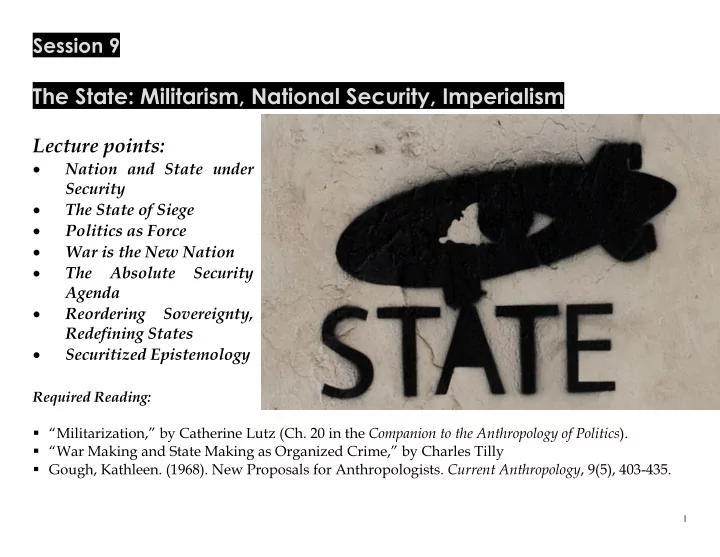

Session 9 The State: Militarism, National Security, Imperialism Lecture points: • Nation and State under Security • The State of Siege • Politics as Force • War is the New Nation • The Absolute Security Agenda • Reordering Sovereignty, Redefining States • Securitized Epistemology Required Reading: � “Militarization,” by Catherine Lutz (Ch. 20 in the Companion to the Anthropology of Politics ). � “War Making and State Making as Organized Crime,” by Charles Tilly � Gough, Kathleen. (1968). New Proposals for Anthropologists. Current Anthropology , 9(5), 403-435. 1
Nation and State under Security Marvin Astrada, American Power after 9/11 . New York: Palgrave Macmillan, 2010. The State of Siege � Violence and legitimacy � Police powers � Karl Marx, the “state of siege”: “periodically employed in every ensuing crisis in the course of [and since] the French Revolution. But barrack and bivouac, which were thus periodically laid on…society’s head to compress its brain and render it quiet; saber and musket, which were periodically allowed to act as judges and administrators, as guardians and censors, to play policeman and do night watchman’s duty; moustache and uniform, which were periodically trumpeted forth as the highest wisdom of society and as its rector—were not barrack and bivouac, saber and musket, moustache and uniform finally bound to hit upon the idea of rather saving society once and for all by proclaiming their own regime as the highest and freeing civil society completely from the trouble of governing itself?...Should not the military at last one day play state of siege in their own interest and for their own benefit, and at the same time besiege the citizen’s purses [and freedoms]?” 2
� Marx, under a state of siege the state “enmeshes, controls, regulates, superintends and tutors civil society from its most comprehensive manifestations of life down to its most insignificant stirrings, from its most general modes of being to the private existence of individuals; where through the most extraordinary centralization this parasitic body acquires a ubiquity, an omniscience, a capacity for accelerated mobility and an elasticity which finds a counterpart only in the helpless dependence [of the people on the state], in the loose shapelessness of the body politic” Politics as Force � politics of international war � force in “all sectors and levels of international affairs…in the realms of global trade, allocation of financial resources, governmental and nongovernmental organizations, military aid, development aid, international embargos, and diplomatic and economic isolation” 3
� “war not only becomes the continuation of politics, but politics becomes the extension of war by other means” (p. 19) � James Madison, fourth president of the US, in 1795: “Of all the enemies of true liberty, war is, perhaps, the most to be dreaded, because it comprises and develops the germ of every other. War is the parent of armies; from these proceed debts and taxes; and armies, and debts, and taxes are the known instruments for bringing the many under the domination of the few….No nation can preserve its freedom in the midst of continual warfare.” War is the New Nation � National Strategy for Homeland Security 2007 : 4
“To best protect the American people, homeland security must be a responsibility shared across our entire Nation . As we further develop a national culture of preparedness, our local, Tribal, State, and Federal governments, faith- based and community organizations, and businesses must be partners in securing the Homeland….This Strategy also calls on each of you ….As we secure the Homeland, however, we cannot simply rely on defensive approaches and well-planned response and recovery measures. We recognize that our efforts also must involve offense at home and abroad” (White House, 2007, p. 5) “In order to realize this vision, the U.S. will use all instruments of national power and influence—diplomatic, information, military, economic, financial, intelligence, and law enforcement—to achieve our goals to prevent and disrupt terrorist attacks; protect the American people, critical infrastructure, and key resources; and respond to and recover from incidents that do occur. We also will continue to create, strengthen, and transform the principles, systems, structures, and institutions we need to secure our Nation over the long term” (White House, 2007, p. 13) 5
� daily war “over the mundane as well as the extraordinary” � “There is not a single aspect of being that does not have state control attached in some form or other” (p. 13) “Executive power in essence thrives by subordinating society to itself, equating itself with the very notion of the people, until the demarcation between the people and the state is blurred and ultimately amalgamated into a cyclical, self- reverential, self-referential, and self-evident equation of executive power = security = the people = the state ” (p. 14) The Absolute Security Agenda � system of knowledge, political philosophy, political organization, militarization, surveillance, coercion, interference in the domestic affairs of select states � an attempted total penetration of the state into almost all areas of life, under the pretext of security 6
Reordering Sovereignty, Redefining States � The unipolar world � ASA rests on “the notion that the international system of states is an extension or an instrument of U.S. power rather than a system and/or society of states comprised of functionally sovereign entities” � US security = global security � the “power to define what a state is and should be” (pp. 6-7) � “significantly impacted traditional notions of sovereignty and other basic ordering principles of international relations” (p. 7) Securitized Epistemology � the meanings of “security”? � waging war against concepts and ideas (p. 6) 7
E.H. Carr: “theories of social morality are always the product of a dominant group which identifies itself with the community as a whole, and which possesses facilities designed to subordinate groups or individuals [in order to impose] its view of life on the community. Theories of international morality are, for the same reason and in virtue of the same process, the product of dominant nations” (quoted in Astrada, p. 16) 8
Recommend
More recommend